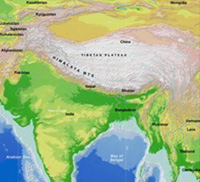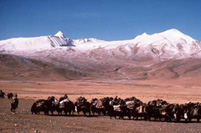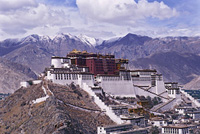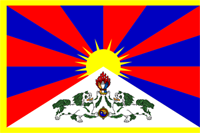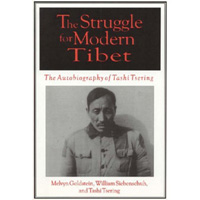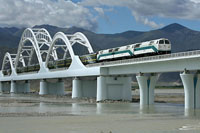
Jochen Welsch
Wachusett Regional High School
Tibet in the AP World History Framework
Can pastoral and/or traditional societies survive in a modern globalized world? What can we learn from traditional societies? Should we try to help traditional societies preserve themselves? What are the ethics involved in sustainable development? These are all questions worth pondering with our students and could serve as the basis for a year end project. How traditional have some societies remained despite being linked to the larger world sometimes in ways that generate great wealth? Are they happy with the compromises they have had to make? What role will climate change play in the future of traditional peoples? Examples include Bedouins in the Middle East, The Tare in West Africa, The Masai in East Africa, The Amish in North America, Indigenous peoples in Canada or Siberia, The Maori in New Zealand, Gauchos in Argentina, and The Laps of Scandinavia/Russia.
Click on the title The Future of Paternalism to access my very short and unfinished powerpoint on the future of pastoral culture in Tibet.
Resources for further research and classroom extension activities:
Click here for the article Mongolian Crossing from National Geographic, 2003
Click here for an article on the effects climate change have had on Mongol herders.
Click here for one about declines in the the reindeer population has affected Mongolian nomads.
 This film explores the lives of nomads in China's inner Mongolia. It explores a younger generations aspirations for modern gadgets and fears of losing traditions.
This film explores the lives of nomads in China's inner Mongolia. It explores a younger generations aspirations for modern gadgets and fears of losing traditions.
 Desert Odyssey episode 2 of National Geographic's Africa series explores life among the Tuareg of Niger as they undertake a salt caravan, a tradition threatened by the introduction of trucks to the Sahara. This could also be used in section 1 or 2 due to its geographic component and the syncretic practices of the Tuareg.
Desert Odyssey episode 2 of National Geographic's Africa series explores life among the Tuareg of Niger as they undertake a salt caravan, a tradition threatened by the introduction of trucks to the Sahara. This could also be used in section 1 or 2 due to its geographic component and the syncretic practices of the Tuareg.
 The 78 minute film Himalayan Herders "pays particular attention to the material culture, knowledge, and skills of mountain pastoralists , while observing the changes that come from incorporation into a National Park, infusion of capital from international wage labor, and political changes in Nepal." This might be a good way of introducing a unit on globalization and traditional societies.
The 78 minute film Himalayan Herders "pays particular attention to the material culture, knowledge, and skills of mountain pastoralists , while observing the changes that come from incorporation into a National Park, infusion of capital from international wage labor, and political changes in Nepal." This might be a good way of introducing a unit on globalization and traditional societies.
Want to help fund a community development project in Tibet (Solar power & yaks?) Click here to learn about Heifer Project International project.
 This site was created by Jochen Welsch at the NEH Summer Institute "Literatures, Religions, and Arts of the Himalayan Region," held at the College of the Holy Cross, Summer 2008.
This site was created by Jochen Welsch at the NEH Summer Institute "Literatures, Religions, and Arts of the Himalayan Region," held at the College of the Holy Cross, Summer 2008.